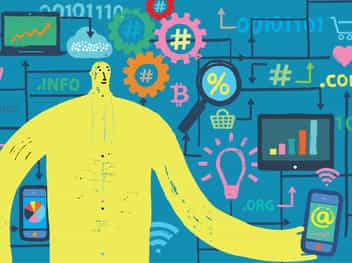
Danish physicist Niels Bohr, who won the Nobel Prize in Physics in 1922, is credited with saying: "If you think you understand it, that only shows that you don't know the first thing about it.”
Something of a philosopher in addition to his scientific pursuits, his words could easily be attributed to businesses (and business leaders) seeking to thrive in the digital world. Your most significant competitor is the one you don't yet know exists. Your most important challenge is one you can't predict. Your most significant opportunity is probably not the one you think it is.
So, how do you get ahead in a world of change beyond our wildest comprehension?
Only the Paranoid Survive: business evolution
In his book, Only the Paranoid Survive: How to Exploit the Crisis Points That Challenge Every Company, founder and former CEO of Intel, Andy Grove, shared his strategy for success. The lesson, he said, "is we all need to expose ourselves to the winds of change".
That is a frightening prospect, especially when he continues: "... if you're wrong, you will die. But most companies don't die because they are wrong; most die because they don't commit themselves. They fritter away their valuable resources while attempting to make a decision. The greatest danger is in Standing still."
We're not suggesting that actual paranoia is the goal. However, we live in a world where it's a fool's errand to proclaim that something is impossible. It, therefore, stands to reason that the only assumption we can ever make is that there is more that we don't know than that which we do. That's a frightening prospect, but it's also an exciting one and most of all, it's a realm in which opportunity lies - but only for those who choose to remain awake, alert and hungry to find it.
From fantasy to reality: innovation and the impossible
Mindset is essential to innovation, whether you're talking about product development or business strategy. Thinking outside the box and letting the imagination run is a common theme that the most forward-thinking businesses have in common.
Google, for example, is famous for many things, including its "20% time" rule. Founders Sergey Brin and Larry Page have written: "We encourage our employees, in addition to their regular projects, to spend 20% of their time working on what they think will most benefit Google." The concept is said to have led to the development of products such as Gmail and AdSense.
It seems that dreaming big is an essential part of being at the forefront of innovation rather than simply following what everyone else is doing. Scientists have credited dreaming with success, and Richard Branson is quoted as saying, "Dreamers move the world forward."
Indeed, why not - once upon a time, James Bond movies showcased seemingly impossible gadgets - X-Ray glasses, microchip implants, jet packs and invisible cars, to name a few. Those who said such things might be real would have been considered eccentric.
Now, the 'Eyes-On Glasses System' allows doctors and nurses to look through patients' skin to more easily locate veins for intravenous (IV) treatments. Everything from smartphones to pets has a microchip implant for GPS tracking, and this year, start-up Synchron successfully implanted a brain chip into a human for the first time in the US. Paramedics in the Lake District recently tested flying suits to reach stranded ramblers in remote areas. Meanwhile, in 2017, Toyota patented a vehicle cloaking device that lets drivers 'see' through car pillars to get a 360-degree view of the road.
If Blockbuster had been able to imagine what would come next instead of continuing to do what had gone before, could they have beaten Netflix to the live stream? After all, Netflix itself started as a DVD rental service.
If all of that is possible, imagine what else you aren't aware of and make your goal impossible.
Businesses are living a past life: software has eaten the world
In 2011, American entrepreneur, investor, and software engineer Marc Andreessen famously wrote his prescient claim: "software is eating the world."
He hypothesised that software companies would disrupt traditional industries. Sure enough, with the rise of massive organisations like Amazon, Netflix, Airbnb and Uber, his prediction appears to have come to pass. Industries have been transformed, and the world has changed since these respective firms have taken over. Some bots can write articles and make phone calls so realistic you're not sure if you're talking to a person or a computer. International warfare can be conducted in the insidious form of election interference through social media and tech.
However, it's worth noting that in multiple cases, these businesses prospered after trial and course correction. Netflix launched in 1997 but became a streaming service in 2007. Amazon opened in 1995 as an online bookseller but leapt from revenue of $15.7 million in 1996 to $148 million in 1997, followed by $610 million in 1998 as it zeroed in on its logistics capabilities and made that the central feature of its appeal. Amazon continues to evolve and is one of the largest companies in the world.
With all the things that we know are possible in the world, those who seek to compete in it have to appreciate that we mere mortals on the ground are living a life that's ten years behind the curve. It's like looking at the stars - what we actually see is the light of something that died a long time ago. If businesses want to be amongst the cosmos instead of staring up at them, then business leaders have to think differently.
Want to be a game changer?
Find out how gigCMO can help




